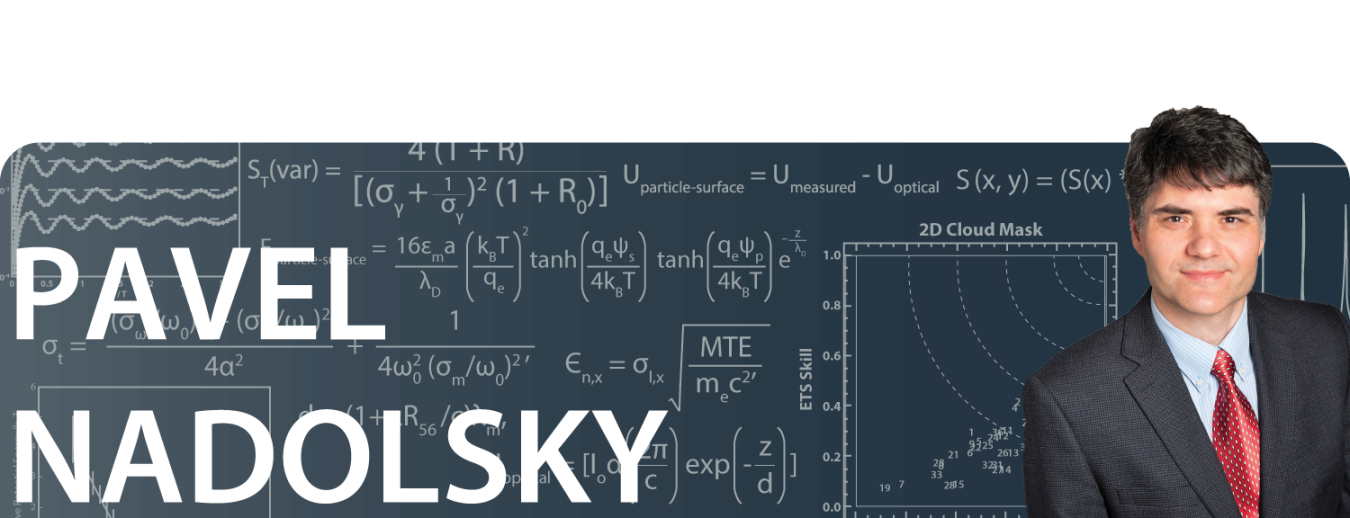Nadolsky is creating state-of-the-art methods in order to learn about elementary particles’ properties.
October 4, 2019
WHAT DID THE 2010 EARLY CAREER AWARD ALLOW YOU TO DO?
The Large Hadron Collider (LHC), the world’s most powerful microscope, seeks solutions to the profound mysteries of physics such as the origin of mass, existence of stable matter, and nature of dark matter. The LHC experimentalists study these questions by producing rare particles, such as Higgs bosons, in collisions of gluons and quarks from incoming proton beams. But, flows of particles observed in a massive LHC detector create large irreducible backgrounds in each interaction of interest.
My Early Career Research Award addressed a ubiquitous “Where’s Waldo?” puzzle of the LHC: How does one find and examine a rare particle in a complex collision event that involves many spectator particles? To study the diminutive Waldos, our research group puts together state-of-the-art methods from quantum field theory and multivariate statistical analysis. These integrated calculations combine insights from multiple areas of theory and experiment in order to learn confidently about the particles’ properties. In the process, we construct detailed models of the inner structure of the protons from a precise large-scale analysis of data from the world experiments, the LHC included. Many LHC measurements employ these proton models in the form of parton distributions.
Funded by the Award, we elevated the accuracy of parton distributions to the higher, three-quantum-loop accuracy. These parton distributions are compared against the precise LHC data; and, as the parton distributions vary under the influence of hundreds of controlled or random factors, we include such variations into uncertainties of parton distributions using multiparametric fits and Monte-Carlo sampling.
ABOUT:
Pavel Nadolsky is an associate professor in the Department of Physics at Southern Methodist University.
SUPPORTING THE DOE SC MISSION:
The Early Career Award program provides financial support that is foundational to young scientists, freeing them to focus on executing their research goals. The development of outstanding scientists early in their careers is of paramount importance to the Department of Energy Office of Science. By investing in the next generation of researchers, the Office of Science champions lifelong careers in discovery science.
For more information, please go to Early Career Research Program page.
THE ORIGINAL 2010 PROJECT ABSTRACT:
Integrated Analysis of Particle Interactions at Hadron Colliders
The objective of this project is to develop theoretical methods to help improve our knowledge about the internal structure of protons and other strongly interacting particles. Theoretically, the internal structure is coded into a set of parameters called the parton distribution functions. Detailed knowledge about these functions is necessary for proper interpretation of the data from high‐energy collision experiments that probe the fundamental properties of matter.
RESOURCES:
J. Gao, M. Guzzi, J. Huston, H.L. Lai, Z. Li, P.M. Nadolsky, J. Pumplin, D. Stump, and C.P. Yuan, “CT10 next-to-next-to-leading order global analysis of QCD.” Phys.Rev.D 89, 033009 (2014). [DOI: 10.1103/PhysRevD.89.033009]
S. Dulat, T.J. Hou, J. Gao, M. Guzzi, J. Huston, P.M. Nadolsky, J. Pumplin, C. Schmidt, D. Stump, and C.P. Yuan, ”New parton distribution functions from a global analysis of quantum chromodynamics.” Phys.Rev.D 93, 033006 (2016). [DOI: 10.1103/PhysRevD.93.033006]
H.L. Lai, M. Guzzi, J. Huston, Z. Li, P.M. Nadolsky, J. Pumplin, and C.P. Yuan, “New parton distributions for collider physics.” Phys.Rev.D 82, 074024 (2010) [DOI: 10.1103/PhysRevD.82.074024]
Additional profiles of the Early Career Research Program award recipients can be found on the Early Career Program Page.
The Office of Science is the single largest supporter of basic research in the physical sciences in the United States and is working to address some of the most pressing challenges of our time. For more information, please visit www.energy.gov/science.
Sandra Allen McLean

Sandra Allen McLean (sandra.mclean@science.doe.gov) is a communications specialist for the Office of Science in the Office of Communications and Public Affairs. Sandra is responsible for identifying, curating, or creating lay-language content about Office of Science-funded research for DOE web sites, popular and trade media, and stakeholder education. She researches and writes the historical Milestone Tweets for the office Twitter account @DOEScience.
Sandra holds an associate degree in American Sign Language interpreting, a bachelor’s in science journalism and biology, and a master’s in Information Sciences. Her hobbies are sewing – especially costumes! – and lesesucht, compounded by extreme tsundoku.


